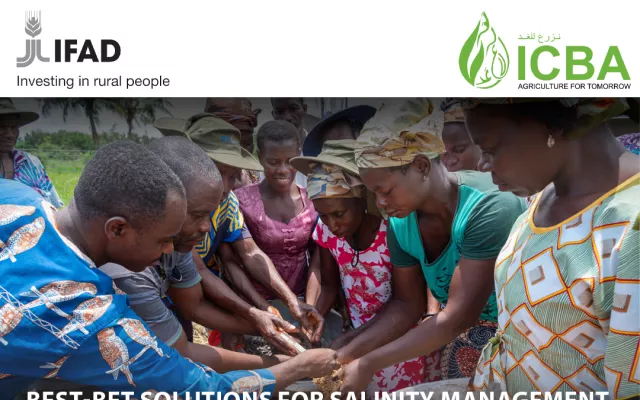Strategic water management solutions and best practices for dry land agriculture
14 نوفمبر 2012
ICBA scientist, Dr Rachael McDonnell, an expert in Water Governance and Policy, was invited to speak at the Qatar National Food Security Program’s International Conference on Food Security in the Drylands held in Doha, Qatar from 14-15 November 2012.
Held under the auspices of the Heir Apparent, His Highness, Sheikh Tamim bin Hamad Al Thani, the conference brought together over 400 people: ministers and senior government officials, policy makers, researchers, development practitioners and representatives of international and regional organizations, farmers’ unions, private and public financial institutions and funds and private agri-business enterprises. The conference was a collaboration between the International Fund for Agricultural Development (IFAD), the World Bank (WB, the United Nations Food and Agriculture Organization (FAO), the United Nations Educational, Scientific and Cultural Organization (UNESCO), the International Center for Agricultural Drylands (ICARDA), the Qatar Environment Environment and Energy Research institute (QEERI) of the Qatar Foundation, the Arab Water Council and the Georgetown University School of Foreign Service in Qatar’s Center for International and Regional Studies Centre (CIRS).
Amongst the presenters in the twelve technical sessions addressing various challenges in the context of Food Security, Water Resources, and Responsible Investment, Dr McDonnell talked about the role of science, knowledge and technology in meeting food-energy-water security challenges in the dry lands. Given the important role of agriculture in the Middle East and North African region, adaptation in terms of agricultural practices and the use of technology have been important in the development of farming systems. Throughout the region, the mounting strains to feeding growing populations under the conditions of increasing water scarcity and land degradation have resulted in food security as a major topic for discussion by policy makers.
Dr McDonnell’s paper presented details of the possibilities and challenges to dryland agriculture in harnessing knowledge and water-management technology from strategic planning through to on-farm activities. Recent advances in space-based observations and cutting-edge modeling in understanding water availability and fluxes at regional and national scales, being developed by ICBA under the MAWRED program, were examined. At the other end of the continuum – the farm-scale – the growing wealth of experience in using sensor technology, crop genetics advances and alternative water and energy sources in managing growing conditions was explored. Finally Dr McDonnell discussed technology in the context of community knowledge development and transfer, policy and management practices, regulations and governance.
The high-level conference included a Ministerial Dialogue on Dry Lands Agriculture under a Changing Climate, which focused on two themes: the Energy-Water-Food nexus and Financing dry land agriculture and food production. This Dialogue culminated in a Doha Declaration, thus highlighting Qatar’s leadership in the area of food security. Accordingly, Qatar has pledged to fund this conference for the next five years.
Pedrick, C; Devlin M, Timmermann, T, compilers. Strategies for Combating Climate Change in Drylands Agriculture. Synthesis of dialogues and evidence presented at the International Conference on Food Security in Dry Lands; 2012 November; Doha, Qatar. ICARDA/CCAFS; 2012.
Held under the auspices of the Heir Apparent, His Highness, Sheikh Tamim bin Hamad Al Thani, the conference brought together over 400 people: ministers and senior government officials, policy makers, researchers, development practitioners and representatives of international and regional organizations, farmers’ unions, private and public financial institutions and funds and private agri-business enterprises. The conference was a collaboration between the International Fund for Agricultural Development (IFAD), the World Bank (WB, the United Nations Food and Agriculture Organization (FAO), the United Nations Educational, Scientific and Cultural Organization (UNESCO), the International Center for Agricultural Drylands (ICARDA), the Qatar Environment Environment and Energy Research institute (QEERI) of the Qatar Foundation, the Arab Water Council and the Georgetown University School of Foreign Service in Qatar’s Center for International and Regional Studies Centre (CIRS).
Amongst the presenters in the twelve technical sessions addressing various challenges in the context of Food Security, Water Resources, and Responsible Investment, Dr McDonnell talked about the role of science, knowledge and technology in meeting food-energy-water security challenges in the dry lands. Given the important role of agriculture in the Middle East and North African region, adaptation in terms of agricultural practices and the use of technology have been important in the development of farming systems. Throughout the region, the mounting strains to feeding growing populations under the conditions of increasing water scarcity and land degradation have resulted in food security as a major topic for discussion by policy makers.
Dr McDonnell’s paper presented details of the possibilities and challenges to dryland agriculture in harnessing knowledge and water-management technology from strategic planning through to on-farm activities. Recent advances in space-based observations and cutting-edge modeling in understanding water availability and fluxes at regional and national scales, being developed by ICBA under the MAWRED program, were examined. At the other end of the continuum – the farm-scale – the growing wealth of experience in using sensor technology, crop genetics advances and alternative water and energy sources in managing growing conditions was explored. Finally Dr McDonnell discussed technology in the context of community knowledge development and transfer, policy and management practices, regulations and governance.
The high-level conference included a Ministerial Dialogue on Dry Lands Agriculture under a Changing Climate, which focused on two themes: the Energy-Water-Food nexus and Financing dry land agriculture and food production. This Dialogue culminated in a Doha Declaration, thus highlighting Qatar’s leadership in the area of food security. Accordingly, Qatar has pledged to fund this conference for the next five years.
Pedrick, C; Devlin M, Timmermann, T, compilers. Strategies for Combating Climate Change in Drylands Agriculture. Synthesis of dialogues and evidence presented at the International Conference on Food Security in Dry Lands; 2012 November; Doha, Qatar. ICARDA/CCAFS; 2012.








